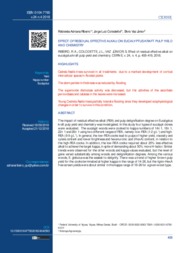Effect of residual effective alkali on eucalyptus kraft pulp yield and chemistry.
Effect of residual effective alkali on eucalyptus kraft pulp yield and chemistry.
Author(s): RIBEIRO, R. A.; COLODETTE, J. L.; VAZ JUNIOR, S.
Summary: The impact of residual effective alkali (REA) and pulp deligniÀ cation degree on Eucalyptus kraft pulp yield and chemistry was investigated. In this study four types of eucalypt clones were evaluated. The eucalypt woods were cooked to kappa numbers of 14± 1, 18± 1, 22± 1 and 26± 1 using two different ranges of REA, namely: low-REA (1-2 g.L-1) and high-REA (8-9 g.L-1). In general, the low-REA cooks lead to pulps of higher yield, viscosity and xylans content and lower brightness and hexenuronic acid (HexA) content, in relation to the high-REA cooks. In addition, the low-REA cooks required about 20% less effective alkali to achieve the target kappa, in spite of demanding about 50% more H-factor. Similar trends were observed for the other woods and kappa values evaluated, but the level of gains varied substantially among woods and deligniÀ cation degrees. Among the various woods, E. globulus was the easiest to delignify. There was a trend of higher brown pulp yield for the cooks terminated at higher kappa in the range of 14-26, but the lignin-HexA free screen yields were about similar in the kappa range of 18-26 for a given wood type.
Publication year: 2018
Types of publication: Journal article
Unit: Embrapa Agroenergy
Keywords: Eucalyptus, Kappa number, Yields
Observation
Some of Embrapa's publications are published as ePub files. To read them, use or download one of the following free software options to your computer or mobile device. Android: Google Play Books; IOS: iBooks; Windows and Linux: Calibre.
Access other publications
Access the Agricultural Research Database (BDPA) to consult Embrapa's full library collection and records.
Visit Embrapa Bookstore to purchase books and other publications sold by Embrapa.

